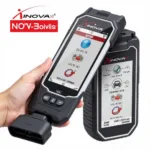The odometer in your car keeps track of how many miles you’ve driven. It’s a critical component for determining your vehicle’s value, maintenance schedule, and overall usage. Sometimes, you might need to change the odometer reading, such as when replacing a faulty instrument cluster or correcting mileage discrepancies. While this process might seem straightforward, it’s essential to understand the legal and ethical implications involved, along with the technical aspects.
This comprehensive guide delves deep into the world of odometer readings, OBD2 scanners, and the legality surrounding odometer adjustments. We’ll explore different methods, the tools required, and answer frequently asked questions to provide you with a clear understanding of this complex subject.
Can You Change Odometer Reading with OBD2?
While OBD2 scanners are powerful tools for diagnosing and sometimes resetting specific vehicle systems, they are not designed to alter the odometer reading. In fact, directly tampering with the odometer reading is illegal in most countries, including the United States and the European Union.
The odometer is considered a legal document reflecting a vehicle’s history. Intentionally misrepresenting the mileage can lead to serious consequences, including fines, legal action, and even criminal charges.
Why Is Changing the Odometer Reading Illegal?
The laws prohibiting odometer tampering are in place to protect consumers from odometer fraud. Odometer fraud, commonly known as “clocking” or “rollback,” is the illegal act of rolling back a vehicle’s mileage to make it appear newer or less driven than it actually is. This deceptive practice allows dishonest sellers to inflate the value of a vehicle and deceive buyers.
Legitimate Reasons to Change Odometer Reading
While tampering with the odometer for fraudulent purposes is illegal, there are legitimate reasons for adjusting the mileage. These situations often involve:
- Instrument cluster replacement: If your car’s instrument cluster malfunctions and needs replacing, the new cluster will display a mileage of zero. In such cases, you’ll need to have the odometer programmed to match the vehicle’s actual mileage.
- Engine or transmission replacement: When a significant component like the engine or transmission is replaced, the vehicle’s mileage might need to be adjusted to reflect the new component’s mileage.
- Tire size changes: Significant deviations from the factory-recommended tire size can affect the accuracy of the odometer reading. Adjustments might be necessary to ensure the mileage displayed is as close to the actual distance traveled as possible.
How to Legally Change Odometer Reading
If you need to adjust your vehicle’s odometer reading for legitimate reasons, it’s crucial to follow the proper legal procedures. Here’s a general guideline:
- Consult a qualified professional: Contact a licensed mechanic or a specialized odometer correction service. These professionals have the necessary expertise and equipment to perform the adjustment accurately and legally.
- Provide documentation: Be prepared to provide documentation supporting the reason for the odometer adjustment. This could include receipts for a new instrument cluster, engine replacement, or other relevant repairs.
- Obtain a certified statement: Ensure the professional provides you with a certified statement documenting the original and adjusted mileage, the date of the correction, and the reason for the change.
FAQs About Changing Odometer Readings
Q: Can I change the odometer reading myself?
A: While DIY odometer correction kits are available online, it’s highly discouraged and potentially illegal to use them. It’s always best to consult a qualified professional for any odometer adjustments.
Q: How can I tell if a vehicle’s odometer has been tampered with?
A: Look for inconsistent wear and tear on the vehicle’s interior and exterior, service records that don’t match the mileage, and any physical signs of tampering on the instrument cluster.
Q: What should I do if I suspect odometer fraud?
A: Report your suspicions to the appropriate authorities, such as your local consumer protection agency or the National Highway Traffic Safety Administration (NHTSA) in the United States.
Conclusion
Understanding the intricacies of odometer readings and the legal boundaries surrounding their adjustment is paramount for every car owner. While OBD2 scanners are invaluable for vehicle diagnostics, remember they are not designed for manipulating mileage. If you need to change your car’s odometer reading, always opt for legal and ethical methods by involving qualified professionals.
By adhering to the law and prioritizing transparency, you contribute to a safer and more trustworthy automotive market for everyone.
If you have any further questions or need assistance with OBD2 diagnostics, our team at OBDFree is here to help. Contact us via WhatsApp: +1(641)206-8880 or Email: [email protected]. We offer 24/7 customer support.
